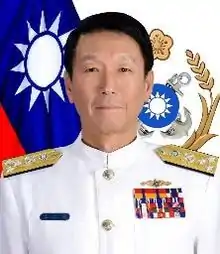Lee Hsi-ming
Lee Hsi-min (Chinese: 李喜明; pinyin: Lǐ Xǐmíng; Wade–Giles: Li Hsi-ming), also known as Lee Hsi-ming,[1] is a retired admiral of the Republic of China (Taiwan) armed forces, and currently serves as the senior research fellow of the Project 2049 Institute in Washington, D.C.
Lee Hsi-min | |
|---|---|
| 李喜明 | |
 | |
| 26th Chief of the General Staff of the Republic of China Armed Forces | |
| In office 1 May 2017 – 30 June 2019 | |
| Preceded by | Chiu Kuo-cheng |
| Succeeded by | Shen Yi-ming |
| 10th Deputy Minister (Policy) of National Defense of the Republic of China | |
| In office 1 June 2016 – 30 April 2017 | |
| Minister | Feng Shih-kuan |
| Preceded by | Chen Yeong-kang |
| Succeeded by | Pu Tze-chun |
| 6th Commander of the Republic of China Navy | |
| In office 30 January 2015 – 31 May 2016 | |
| Preceded by | Chen Yeong-kang |
| Succeeded by | Huang Shu-kuang |
| Personal details | |
| Born | 20 November 1955 Taiwan |
| Nationality | Republic of China |
| Military service | |
| Allegiance | |
| Branch/service | |
| Years of service | 1970–2019 |
| Rank | |
| Battles/wars | Third Taiwan Strait Crisis |
Lee served over 40 years in the ROC armed forces. His major assignments include the Chief of the General Staff (from 2017 to 2019),[2] Vice Minister (Policy) of National Defense (from 2016 to 2017), and Commander of the Republic of China Navy (ROCN, from 2015[3][4] to 2016). As Chief of the General Staff, Lee coordinated the policy of carrying out the Overall Defense Concept (ODC)[5] and improving military exercises and the preparedness of joint operations. He was among the first personnel to coordinate the transfer of Chien Lung-class (Zwaardvis) submarines from the Netherlands and established an advanced submarine personnel training system before he became a submarine operations officer and captain. As a submarine captain from 1995 to 1997, he and his crew were deployed to prepare for the potential encounter with the People’s Liberation Army Navy fleets during the Third Taiwan Strait Crisis in 1996.[6] In June 2019, Lee was awarded the Order of the Cloud and Banner with Special Grand Cordon.[7] He retired on 1 July 2019.[8] Lee graduated from the 1977 class of the ROC Naval Academy and the 1998 class of the U.S. Naval War College.
After he retired from the post of Chief of the General Staff in 2019, Lee has advocated for an asymmetric strategy for Taiwan such as the Overall Defense Concept (ODC), to the general public.[9][10][11][12][13] One of the examples is in his book, The overall defense concept: an asymmetric approach to Taiwan's defense (臺灣的勝算:以小制大的不對稱戰略,全臺灣人都應了解的整體防衛構想), written in 2022.[14]
Works
- 2009, "如何正確運用電腦兵棋系統". Navy Professional Journal (海軍學術雙月刊), 43(5), 38-42.
- 2021, Taiwan's Overall Defense Concept: Theory and the Practice. Hoover Institute, Stanford University, California, United States.
- 臺灣的勝算:以小制大的不對稱戰略,全臺灣人都應了解的整體防衛構想 [The overall defense concept: an asymmetric approach to Taiwan's defense] (in Chinese). Taiwan: 聯經出版. 2022. ISBN 9789570864878.
See also
References
- "Welcome to the Republic of China Navy website". Republic of China Navy (ROCN). 2016. Archived from the original on 2016-03-17. Retrieved 2016-05-17.
- 陳建興 (2017-04-28). "馮部長主持參謀總長任職布達 李喜明上將接任" (in Chinese (Taiwan)). 軍聞社 (Military News Agency). Archived from the original on 2017-04-28. Retrieved 2017-04-29.
- "Admiral Kao Kuang-chi succeeds Yen Ming as defense minister". Taiwan News. 2015-01-27. Retrieved 2015-06-10.
- "Navy Takes Lead in Taiwan Military Reshuffle". DefenseNews. 2015-01-31. Retrieved 2015-01-10.
- "Taiwan's Overall Defense Concept, Explained". thediplomat.com. Retrieved 2023-05-24.
- "People – Project 2049 Institute". Retrieved 2023-05-24.
- Su, Yung-yao; Hsiao, Sherry (27 June 2019). "Chief of general staff given military order after nearly 50 years of service". Taipei Times. Retrieved 27 June 2019.
- Yu, Matt; Chung, Yu-chen (1 July 2019). "Taiwan's new chief of military staff takes office". Central News Agency. Retrieved 2 July 2019.
- 紀永添 (2022-09-15). "紀永添專欄:不對稱戰力與傳統建軍方向未必相互排斥". www.upmedia.mg (in Chinese (Taiwan)). Up Media. Retrieved 2023-04-16.
他所提出的「整體防衛構想(Overall Defense Concept)」,認為應發展小型、致命、機動性高、不易被摧毀的武器,來強化國軍的嚇阻能力。
- "Taiwan's Overall Defense Concept, Explained". thediplomat.com. Retrieved 2023-05-24.
- "Xi Jinping may attack Taiwan to secure his legacy, warn Admiral Lee Hsi-min and Eric Lee". The Economist. ISSN 0013-0613. Retrieved 2023-05-24.
- "Opinion | The likelihood of China invading Taiwan increases every day. What the U.S. should do". NBC News. 2021-07-09. Retrieved 2023-05-24.
- Theil, Anders Fogh Rasmussen, Anne-Marie Slaughter, David Petraeus, Lee Hsi-min, Graham Allison, Rose Gottemoeller, Elisabeth Braw, Craig Singleton, Chris Krebs, Tai Ming Cheung, Maria Shagina, Mauro Gilli, Vance Serchuk, Stefan (2023-01-05). "Lessons for the Next War". Foreign Policy. Retrieved 2023-05-24.
{{cite web}}: CS1 maint: multiple names: authors list (link) - 陳嘉宏 (2022-09-15). "陳嘉宏專欄:「台灣的勝算」不在於內部找敵人". www.upmedia.mg (in Chinese (Taiwan)). Up Media. Retrieved 2023-04-16.
前參謀總長李喜明寫了一本《台灣的勝算》,深入剖析其所主張的以小制大不對稱作戰戰略,以其曾經身為軍令最高首長的身份,在台灣的政軍界引起相當多的迴響與不同看法。